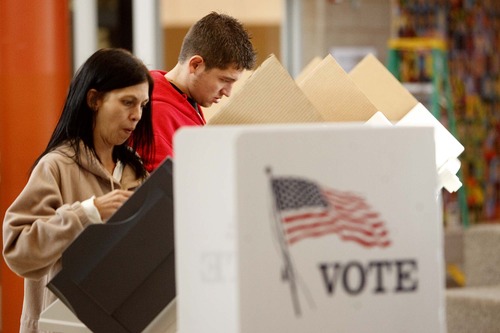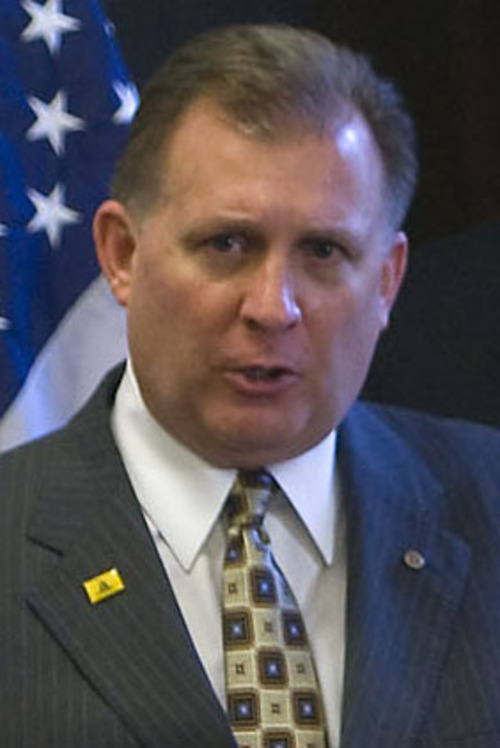This is an archived article that was published on sltrib.com in 2014, and information in the article may be outdated. It is provided only for personal research purposes and may not be reprinted.
A breakthrough in negotiations that would have led to the end of the Count My Vote initiative apparently fell apart late Friday, prompting the group to scuttle a Saturday morning news conference as the sides went back to the negotiating table.
The deal, which was agreed to Friday afternoon, would have changed Utah's nominating system to ensure future candidates for office could get gather signatures to get on the primary ballot without having to go through the parties' caucuses and conventions.
As a result, Count My Vote, which had spent more than $1 million gathering 100,000-plus signatures on a voter initiative aimed at supplanting the caucus-convention system with direct primaries, would have been abandoned once the bill was signed by the governor.
The group notified supporters and volunteers Friday night in a conference call of its plans to suspend its initiative effort, and the deal was to be announced a news conference with the sponsor of the legislation, Sen. Curt Bramble, R-Provo, at the Capitol Saturday morning.
That press conference was cancelled overnight, but the deal isn't dead, said Ric Cantrell, Senate chief of staff.
"It's a big issue and there are some details to work through," Cantrell said.
On Friday, Bramble wouldn't confirm a deal, but acknowledged progress had been made.
"There have been substantive discussions between members of the Legislature and Count My Vote and we're hopeful a resolution can be reached that will bring some positive reforms to the electoral process," Bramble said.
The bill, SB54 is scheduled to go before a House committee Monday morning.
But late Friday, the deal crumbled, although the reasons for the breakdown were still unclear Saturday morning.
Under the framework for SB54 that had been agreed to, political parties would have kept their existing caucus system — where delegates chosen at neighborhood caucuses typically choose nominees at the party conventions — but would also have been required to accept the alternative path to the primary ballot.
According to sources familiar with the deal, in order to be recognized as a "qualified political party," a party would have to allow unaffiliated voters to vote in its primaries, allow absentee voting for delegates at the party convention, and accept an alternative path to the ballot.
A candidate who chooses not to go through the party-convention gantlet could gather a number of signatures from registered voters and advance to the primary ballot.
Under the proposed framework, a candidate running for statewide office would need to collect signatures from 28,000 voters to advance to the primary ballot.
A quarter of that number would be needed to run for one of the four congressional districts. State senate candidates would need to gather 2,000 signatures and House candidates would need half that number.
The signatures could come from any registered voter, regardless of party.
Candidates could begin collecting signatures on Jan. 1 of the election year and would be required to file the same campaign finance disclosure reports as other candidates.
Count My Vote began gathering signatures last September, arguing that the caucus-convention system excludes people who can't attend the caucuses, under-represents women, and yields candidates who are outside the mainstream.
They recommended having candidates square off in direct primaries for the party nomination.
The original version of Bramble's SB54 would have incorporated direct primaries, but also would have given parties a broad avenue to circumvent the primary process — essentially nullifying the initiative in the process — if they complied with certain requirements regarding absentee voting and the support a nominee would need to avoid a primary.
Count My Vote had publicly denounced Bramble's bill, suggesting it is a cynical attempt to suppress the ability of voters to make their voice heard through a ballot initiative.
They had rolled out endorsements from former Republican presidential candidate Mitt Romney and long-time U.S. Sen. Orrin Hatch, who also gave the effort $50,000 from his political action committee, records show.
This week, the group said it had gathered 100,000 of the roughly 102,000 signatures needed to get on the ballot, although it did not say if it had gathered the signatures in 26 of the 29 Senate districts, as is required to put the measure on the ballot.
Utah Republican Party Chairman James Evans said he was notified when negotiations were underway, but the party wasn't part of the talks — in part because being party to the discussions could impede a future legal challenge to SB54.
"As a political party, we always reserve the right to protect our freedom of association, but we want to see what the final agreement looks like," Evans said. "We certainly are appreciative of the Legislature trying to find a way to preserve the caucus and convention system, as well as address the concerns of increased participation. That has always been the goal of the party."
Another potential wildcard in the entire process: Sen. Scott Jenkins, R-Plain City, still has a proposed amendment to Utah's Constitution that would state that a party's right to choose its candidates however it wants cannot be infringed. The bill was approved by a committee this week and is awaiting a vote in the Senate.
Asked Friday if he would stand down if a deal was struck with Count My Vote, Jenkins grinned and said, "We'll have to see."





